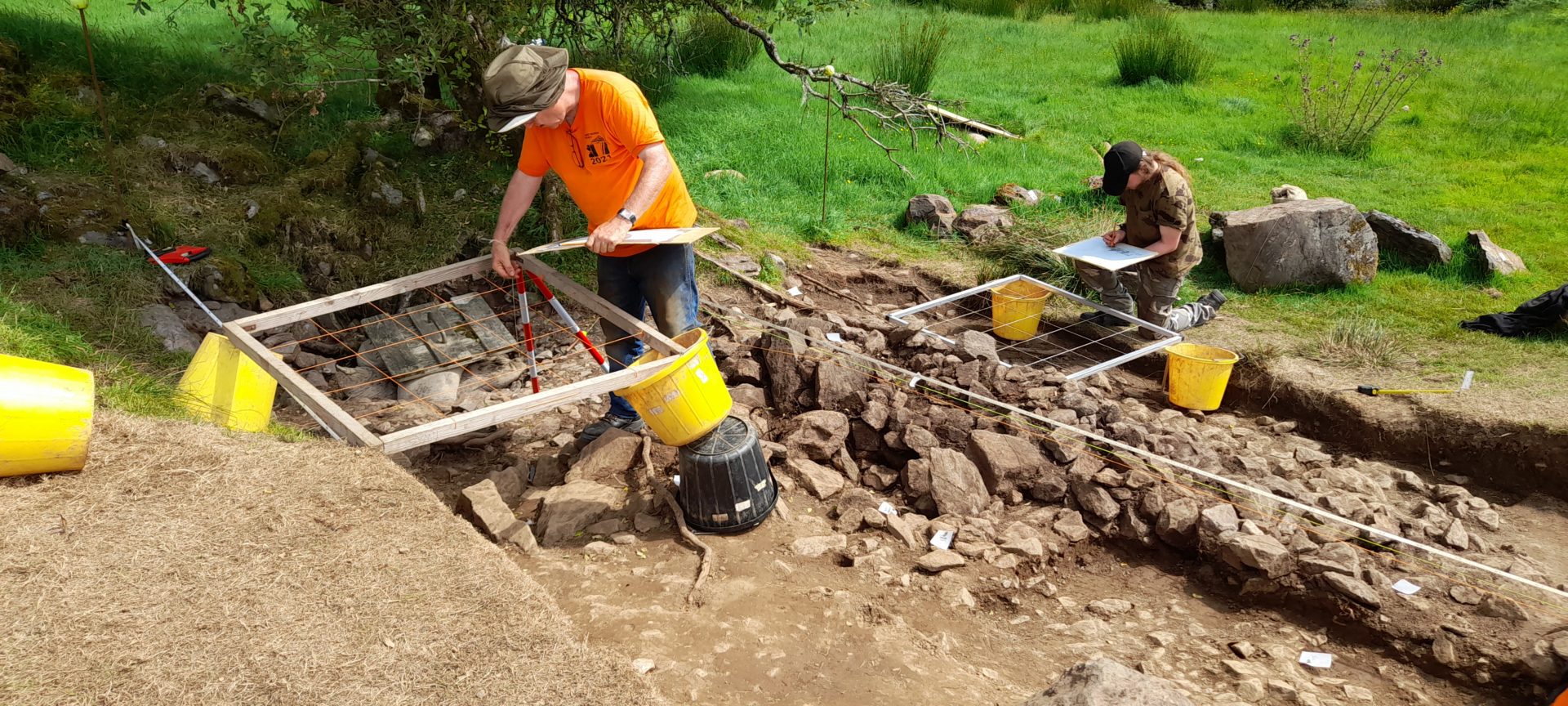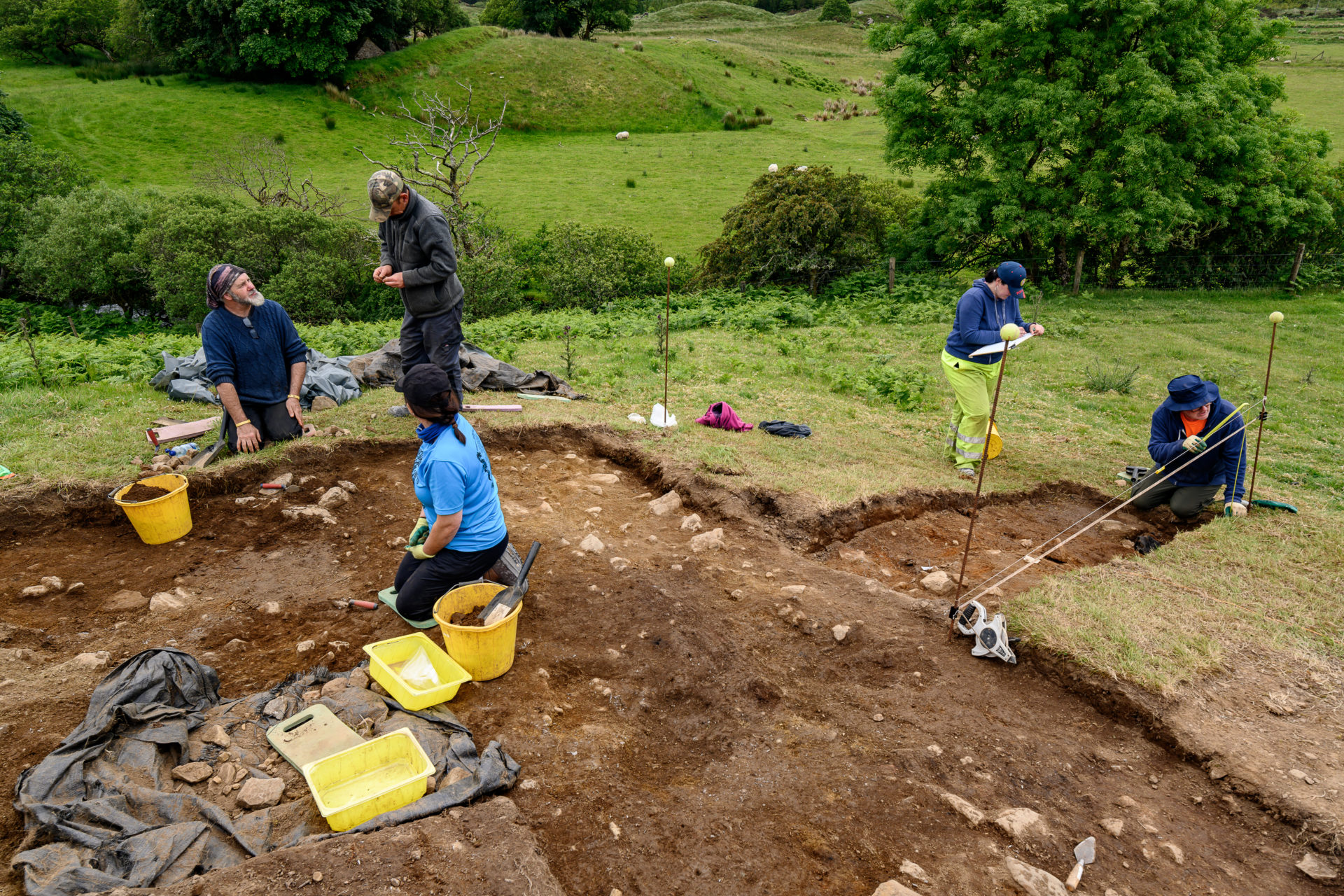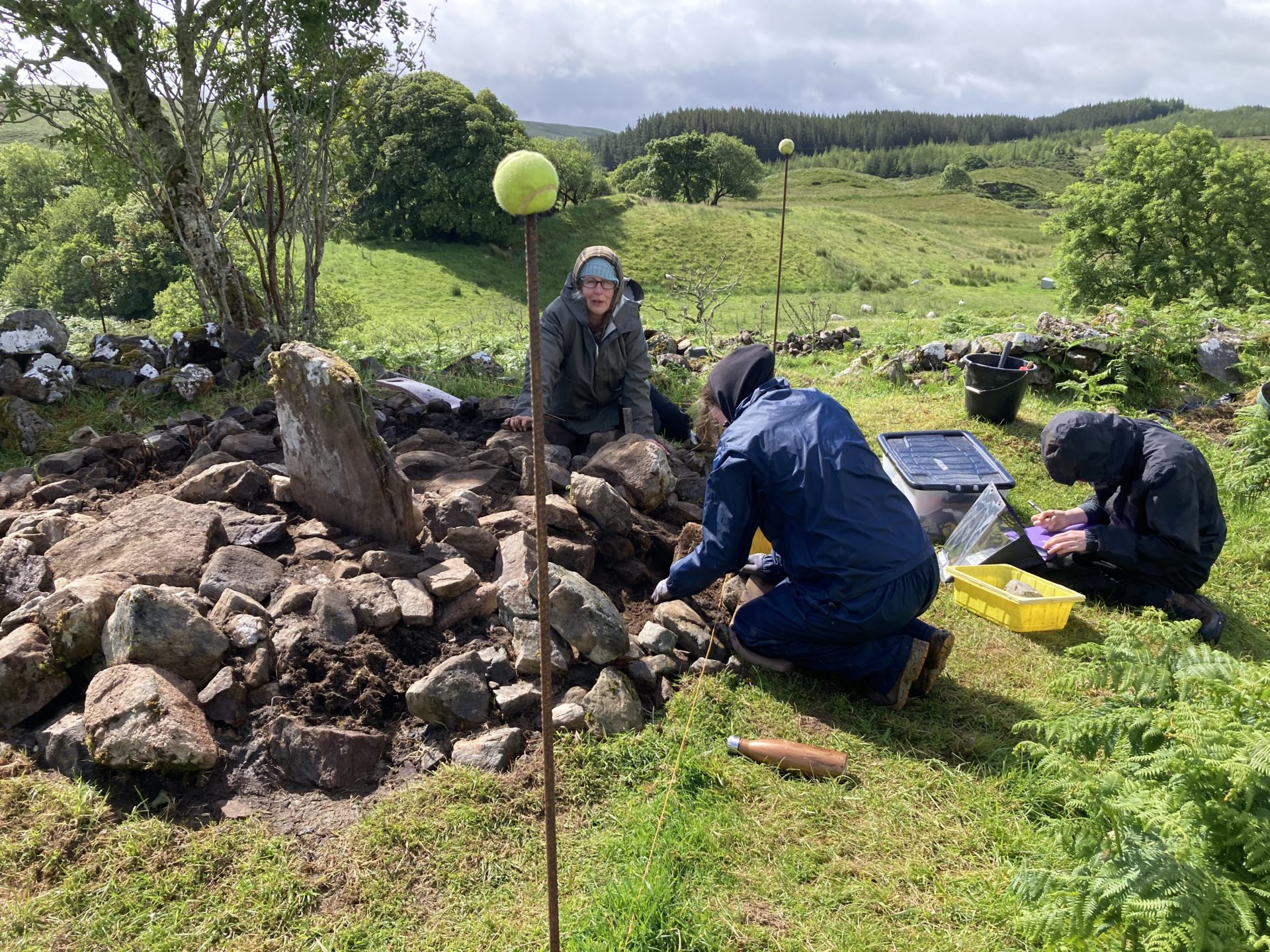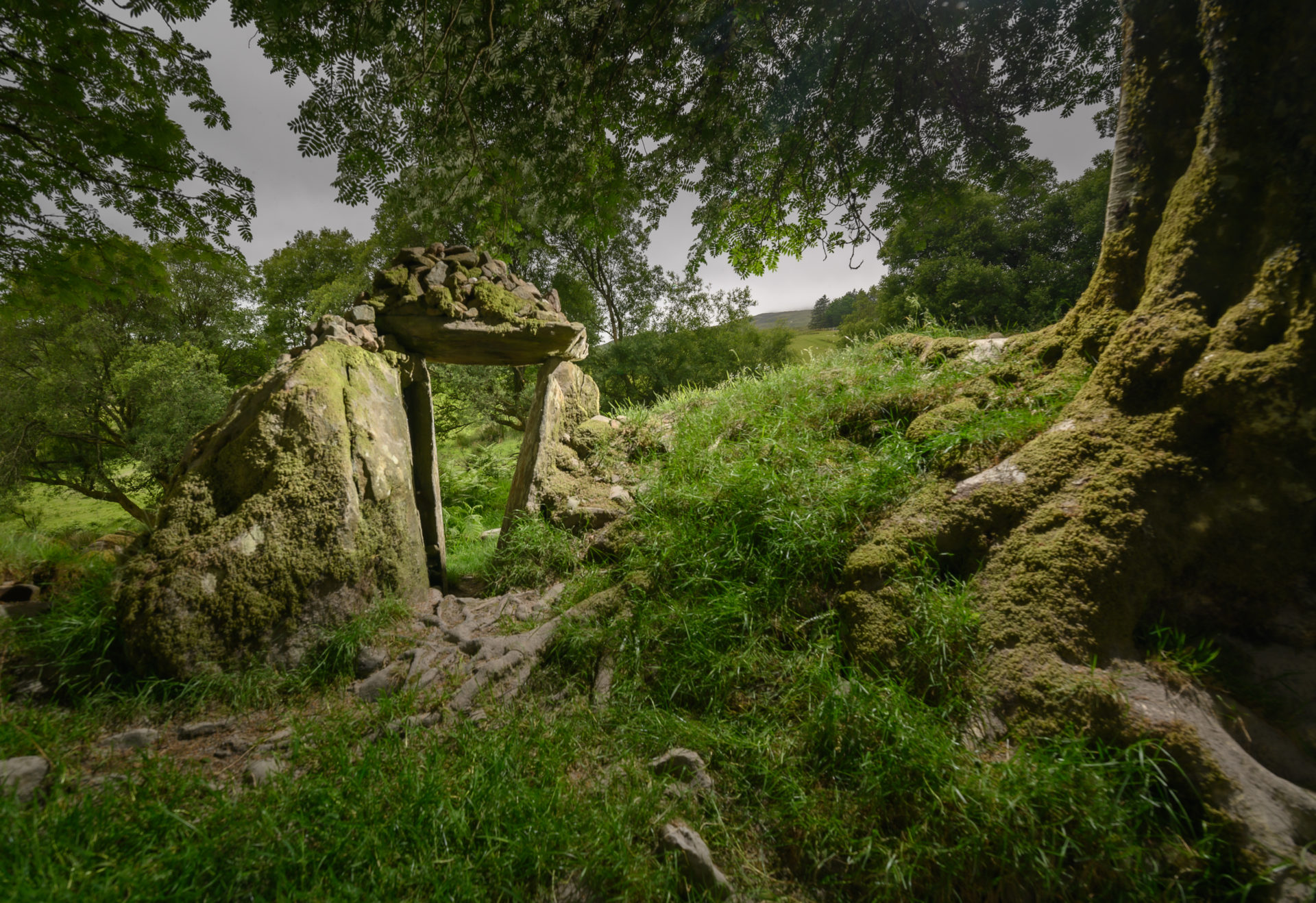Course Summary
The aim of this programme is to provide theoretical knowledge and practical experience of archaeological excavation and post-excavation analysis skills. For 2024 the course is based at the early medieval ecclesiastical complex of Disert, Co. Donegal, and at our Archaeology Laboratory at Atlantic Technological University Sligo in the Northwest of Ireland.
The programme is made up of two modules. Online classes (2 hours per week) commence from late February 2024. By completing the theoretical aspects of the course online, and in advance of the field school, students gain the maximum benefit from their time in the field. Students then attend practical sessions in Sligo and Donegal in June 2024. By the end of the programme, students will have gained hands-on experience excavating on this wonderful medieval and post-medieval site and will understand what is involved in post-excavation analysis and how these fit into a larger research project. Students will also have a knowledge of Irish archaeology and history, with a particular focus on the landscapes of NW Ireland.
Other archaeology certificate courses you may be interested in: https://www.atu.ie/flexible-learning-courses-in-archaeology
This certificate course will be delivered by Dr Fiona Beglane and Dr Marion Dowd.



Key Course Information
Key Course Information
This SPA will comprise two modules, each worth 5 credits:
- Archaeological Excavation and Post-Excavation 1
- Archaeological Excavation and Post-Excavation 2
Note that modules "Archaeological Excavation and Post-Excavation 1" and "Archaeological Excavation and Post-Excavation 2" must be completed in the same semester, except where the student has already successfully completed the module 'Archaeological Excavation and Post-Excavation 1'.
Disert
Disert is a ritual pilgrimage landscape in Co. Donegal, that includes a series of early ecclesiastical enclosures, penitential cairns, a holy well dedicated to St Colmcille (also known as St Columba), a post-medieval altar and a cillín (children’s graveyard). It may date to as early as the sixth century AD when it was reputedly founded by St Colmcille, however there is also evidence for prehistoric activity. Disert is still important today for religious devotion and for pilgrims seeking cures associated with the well water, soil and monuments. The site lies directly under Carnaween Mountain, another pilgrimage site, which has deep folkloric associations with the legendary Fionn MacCumhaill (Finn MacCool). In 1611 Niall O’Boyle, Bishop of Raphoe died at Gleann Eidhnighe (Glen Eany), most likely at Disert, suggesting occupation at that time. Although owned by the Church of Ireland, this isolated place was used for secret Roman Catholic worship during Penal times in the seventeenth and eighteenth centuries. Pilgrimage has been an aspect of Irish life from prehistoric to modern times and sites like Disert played a key role in this. With such a rich history, Disert is of great archaeological and historical importance.
The Irish word Dísert derives from the Latin desertum, usually translated as ‘hermitage’, ‘isolated place’ or ‘a place apart’ and occurs in about 84 locations around Ireland, however very few have been the subject of study. Due to its isolated location, Disert did not become a parish church or the site of an abbey or friary of the later medieval period. As such, Disert provides a unique opportunity to examine a site with little later- and post-medieval construction activity, allowing the project to shed light on the chronology, organisation and evolution of the site in particular, and more generally on the development of the early church in the northwest of Ireland. This fascinating topic has generated considerable historical research, but little archaeological excavation, a lack that this project seeks to address.
Location and travel
During the excavation a bus will bring students between Donegal Town and Disert daily. Post-excavation analysis will take place at ATU Sligo. Students are responsible for their own transfer at the start/end of the course and for transfer between Sligo and Donegal. Bus Eireann Expressway buses run frequently and directly between Donegal and Sligo, and also between Dublin Airport and both Donegal and Sligo. Advice will be provided to students at the online sessions.
Accommodation and food
Accommodation and food are not included but suitable facilities will be recommended at the online sessions. This allows students to suit their own budget and needs, and to share accommodation if they wish to do so. Those without their own transport will need to stay within walking distance of the daily pick-up points.
Fitness and safety
Note that the excavation requires a reasonable level of physical fitness. Students will need to be able to walk over rough ground for 500m or more without difficulty, excavation is a physical activity that requires a similar level of fitness to gardening. You should be aware that you may be outside in all weathers for extended periods.
The Excavation (3 -14 June 2024)
Survey work at Disert started in 2016, and a series of excavations took place between 2019 and 2022. These yielded considerable evidence for nineteenth and early twentieth century lazy-bed agriculture and dairying in and around this formerly sacred land. They shed light on population growth and the need for land at this time, which led to the expansion of settlement into marginal areas. Intriguingly, prehistoric stone tools were found, providing the first evidence for pre-Christian activity at Disert. Excavation of the main ditch surrounding the early medieval ecclesiastical enclosure shows that it was dated to the early seventh century. This was later reused with evidence for a number of hearths and craftworking activity dating to the tenth century. Excavation of three cairns on the site showed that two of these supported upright slabs, possibly reused early medieval cross slabs, and that these cairns originated in the late medieval/post-medieval periods.
In 2024 the excavation will examine the enigmatic ‘arch’ enclosure. This previously unexcavated feature, abutting the main ecclesiastical enclosure, has been variously suggested to be the remains of a megalithic tomb, a hermit’s retreat, or a sheep pen. The aim will be to determine the dating and nature of the enclosure. Students will contribute to this overall aim through their input to the survey, excavation and recording work on site. Disert is visited regularly by tourists, and students will also have the opportunity to develop skills in explaining heritage to members of the public.
The Post-excavation Analysis (17-21 June 2024)
Post-excavation analysis will take place in the Archaeology Lab at ATU Sligo. Students will undertake essential tasks such as washing artefacts and ecofacts; processing soils for specialist analysis; preparing stratigraphic matrices and reports; illustrating and photographing artefacts. They will gain an awareness of the component parts of the post excavation process and the roles played by various specialists. They will contribute material for creation of the final excavation report and ultimately work towards bringing an excavation to full publication, and the preparation of the archive for final deposition in the National Museum of Ireland.

Application Closing Date : 16th August 2024
Entry Requirements
This SPA is open to all qualified applicants, those with an existing Level 5, and individuals who have other relevant experience.
Career Opportunities
Graduates of this SPA may find work as guides or volunteers in local museums and heritage centres; as guides on OPW sites; as General Operatives or volunteers on research excavations; and as General Operatives or volunteers on commercial excavations.
This SPA will also cater to the interested public, not desiring credits.
The cert will be of benefit to those who currently work in the national and international tourist market and wish to upskill, including tourist bus drivers/guides, those in cultural heritage tourism, those who run their own tourism companies or heritage centres, and those who working with local community groups on heritage tourism and/or heritage education.
This SPA could also be offered as a CPD course for local authorities.
Further Study
Graduates may progress to another Level 6 or Level 7 SPA programme. The following archaeology programmes are currently offered by ATU Sligo:
SG_SARCH_S06 , SPA Archaeological Excavation and Post-Excavation , L6 , ECTS 10
SG_SARCI_S06 , SPA Archaeological Excavation and Post-Excavation (International) , L6 , ECTS 12
SG_SARCJ_S06 , SPA Archaeological Field Studies (International), L6 , ECTS 18
SG_SINTR_S06 , SPA Introduction to Irish Archaeology , L6 , ECTS 15
SG_SPREH_S06 , SPA Prehistoric Archaeology of Ireland and Europe , L6 , ECTS 15
SG_SIRIS_S06 , SPA Irish Medieval History and Archaeology , L6 , ECTS 15
SG_SINTR_S07 , SPA Introduction to Archaeological Interpretation , L7 , ECTS 15
SG_SRITU_S07 , SPA Ritual and Meaning in Archaeology , L7 , ECTS 15
SG_SBUIN_S07 , SPA Buildings Archaeology (Online), L7 , ECTS 15
SG_SBUIM_S07 , SPA Buildings Archaeology (Blended) , L7 , ECTS 15
For further information, please visit Archaeology at ATU.
Programme Fees
Academic Year 2024/25 Fees
Total Programme Fees: €3,000
To help make the payment of fees more manageable for students who are self-funding their studies, tuition fees can be paid through payment instalment plans at ATU Sligo. For further information on instalment plans, please visit our Fees and Funding webpage.
If you apply and are approved for an online course at ATU Sligo, you will be required to pay a non-refundable deposit of €250 to secure your place. Your deposit will then be credited against the course fees once you are registered as a student. Students at ATU Sligo are also eligible to claim tax relief at the standard rate for tuition fees.
For further information and guidance about Fees and Funding for online and part-time courses at ATU Sligo, click here.
If you are seeking to take your exams online, and you meet the eligibility criteria (overseas students and those with extenuating circumstances), an additional examinations fee will apply. For further information, please visit our Examinations webpage.
Course Format
Semester 1
| Title | Credits |
|---|---|
| Archaeological Excavation and Post-Excavation 1 | 05 |
| Archaeological Excavation and Post-Excavation 2 | 05 |